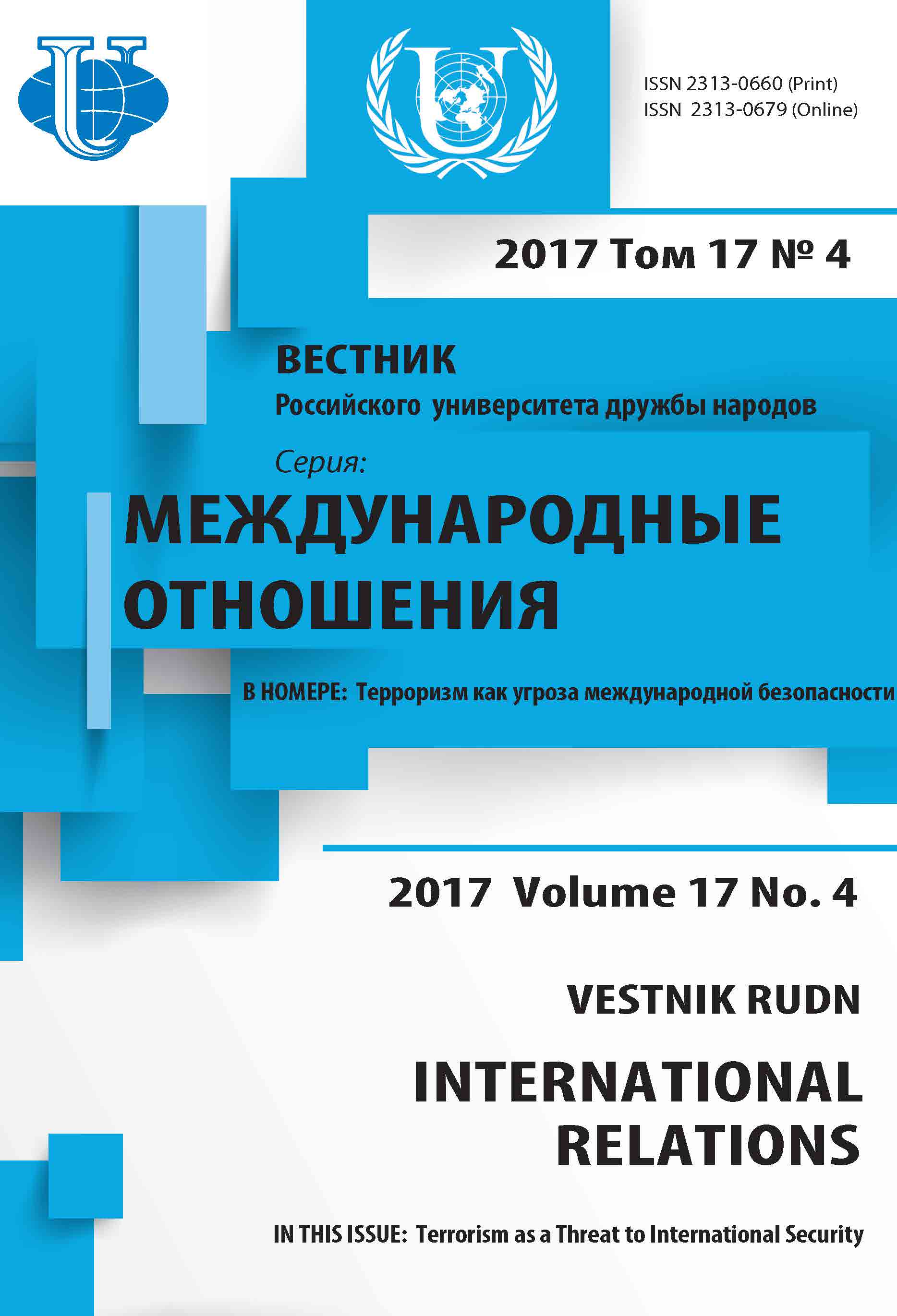INTERNATIONAL NON-GOVERNMENTAL ORGANIZATIONS (INGOs) IN THE EVENTS OF THE «ARAB SPRING» IN EGYPT: ROLE, MECHANISMS OF INTERFERENCE AND RESULTS
- Authors: Shitova AV1
-
Affiliations:
- Institute for Аfrican Studies of the Russian Academy of Sciences
- Issue: Vol 17, No 4 (2017): Terrorism as a threat to international security
- Pages: 749-759
- Section: PEACE AND SECURITY
- URL: https://journals.rudn.ru/international-relations/article/view/17533
- DOI: https://doi.org/10.22363/2313-0660-2017-17-4-749-759
- ID: 17533
Cite item
Full Text
Abstract
“Arab spring” has launched a process of large-scale political transformation of the countries in the North Africa and the Middle East. There are many “points of tension” in the region of North Africa, in which converge the political and economic interests of external actors, including international non-governmental organizations (INGOs). The lobbying of democratic values as opposed to clan interests led to the strengthening of the role of the West in relation to the state and public institutions of the North Africa and the Middle East. Moreover, academic community recognizes that currently INGOs actively participate in modern international relations, in internal policy of the countries where they perform their activities. Their actions have even more significant impact during the times when the political regimes change. This article aims to analyze the activities of INGOs before, during and after the change of H. Mubarak’s government in Egypt, under the governments of M. Mursi and A.F. As-Sisi (2010-2016 gg.). The article deals with several active INGOs of the “Arab Spring”, such as National Democratic Institute, International Republican Institute, Carter Center and other. The analysis of the activities of the above-mentioned INGO allows us to draw conclusions about their strategies, methods, and instruments of modern technologies facilitating the change of the political regime. The most common mechanisms of INGOs influence on political transition were participation in or-ganization of the electoral process, organization of election campaigns, seminars, consultations for civil society that promote the emergence of new potential political leaders. Great attention in this article is paid to the socio-economic situation in Egypt after the mass unrest. The author shows how the external forces behind foreign NGOs contributed to the political transition, and relates to the ambiguous results for population it has brought. Methodological basis of this study was system and comparative methods of analysis, event-analysis.
About the authors
A V Shitova
Institute for Аfrican Studies of the Russian Academy of Sciences
Author for correspondence.
Email: avshitova8@gmail.com
Shitova Alexandra Vyacheslavovna - post-graduate student of the Institute for African Studies, Russian Academy of Sciences
References
- Brechenmacher, S. (2017). Civil Society Under Assault: Repression and Responses in Russia, Egypt, and Ethiopia. Carnegie Endowment. URL: http://carnegieendowment.org/2017/05/18/ civil-society-under-assault-repression-and-responses-in-russia-egypt-and-ethiopia-pub-69953 (accessed: 11.07.2017).
- Carothers, T. (2017). Democracy Policy Under Obama Revitalization or Retreat? Carnegie Endowment. URL: http://carnegieendowment.org/files/democracy_under_obama.pdf (accessed: 19.04.2017).
- Dolgov, B.V. (2012). “Arab Spring”: results and prospects. Perspectives. URL: http://www.perspektivy.info/book/arabskaja_vesna_itogi_i_perspektivy_2012-04-19.htm (accessed: 10.03.2017). (in Russ.).
- Elagati, M. (2013). Foreign Funding in Egypt after the Revolution. FRIDE. URL: http://fride.org/ publication/1117/foreign-funding-in-egypt-after-the-revolution (accessed: 18.03.2017).
- Fakhrutdinova, N.Z. (2013). And was there “Arab Spring”? Rise in the Arab world: crops and shoots, 5, 27—32. (in Russ.).
- Gaidukevich, L.M. (2012). “Arab Spring” 2011: democratic transformation or geopolitical redistribution of the region? Journal of International Law and International Relations, 1, 29—34. URL: http://www.elib.bsu.by/bitstream/123456789/31198/1/2012_1_JILIR_gaidukevich.pdf (accessed: 12.02.2017). (in Russ.).
- Ghabra, S. (2015). The Egyptian Revolution: Causes and Dynamics. Routledge Handbook of the Arab Spring. Rethinking Democratization. URL: https://biblio.parlament.ch/e-docs/PDF_I/ 368249.pdf (accessed: 23.04.2017).
- Greenfield, D., Hawthorne, A. & Balfour, R. (2013). US and EU: Lack of Strategic Vision, Frustrated Efforts Toward the Arab Transitions. Atlantic Council. URL: http://www.atlanticcouncil.org/ images/publications/US_EU_Lack_of_Strategic_Vision_Frustrated_Efforts_Toward_Arab_ Transitions.pdf (accessed: 02.05.2017).
- Guilmain, O. (2012). L’influence des ONG américaines sur le printemps arabe: l’exemple de la National Endowment for Democracy. La face cache des revolutions arabes, 387—388.
- Housseini, B. (2009). Middle-Eastern and North African NGOs’ Participation in the United Nations Economic and Social Council: Current Situation, Challenges and Solutions. Website UN. Department of Economic and Social Affairs. URL: http://csonet.org/content/documents/MENA.pdf (accessed: 20.12.2016).
- Krylov, A.V. (2012). “Arab spring” in the context of plans to review the boundaries of the Greater Middle East. URL: http://old.mgimo.ru/news/experts/document220009.phtml (accessed: 10.03.2017). (in Russ.).
- Lavie, L. (2017). The Egyptian Muslim Brothers’ ideal state model: a religious state — out; a civil state — in. Middle East Studies, 53(6), 996—1012. DOI: http://dx.doi.org/10.1080/ 00263206.2017.1350845.
- Mirsky, G.I. (2013). Egypt at a time of great change. Year of the planet. Yearbook, 397—408. (in Russ.).
- National Democratic Institute. Three Decades of Working for Democracy and Making Democracy Work. (2014). URL: https://www.ndi.org/sites/default/files/2014%20NDI%2030th%20 Anniversary% 20Report.pdf (accessed: 19.09.2017).
- Sadiki, L. (2015). Unruliness through Space and Time. Reconstructing “Peoplehood” in the Arab Spring. Routledge Handbook of the Arab Spring. URL: https://www.routledgehandbooks.com/ doi/10.4324/9781315763026.ch1 (accessed: 23.03.2017).
- Sharp, J. (2005). From dictatorship to democracy: Strategy and tactics of liberation. Transl. by N. Kozlovskaya, Moscow: New Publishing House. (in Russ.).
- Shumilin, A.I. (2015). US policy in the Middle East in the context of the “Arab Spring”. Moscow: International Relations. (in Russ).
- Vasiliev, A.M. (2015). Cooperation of the Russian Federation with the Arab Republic of Egypt: opportunities and limitations. The Russian Council for International Affairs (INF), 22. Moscow: Special book. (in Russ.).
- Zheltov, V.V. & Zheltov, M.V. (2014). Internet, protest movements and the Arab Spring. Territory of new opportunities. Bulletin of the Vladivostok State University of Economics and Service, 1 (24), 189—204. URL: http://cyberleninka.ru/article/n/internet-protestnye-dvizheniya-i-arabskaya-vesna (accessed: 17.11.2016). (in Russ.).
Supplementary files










